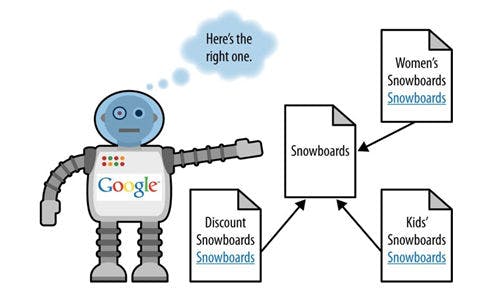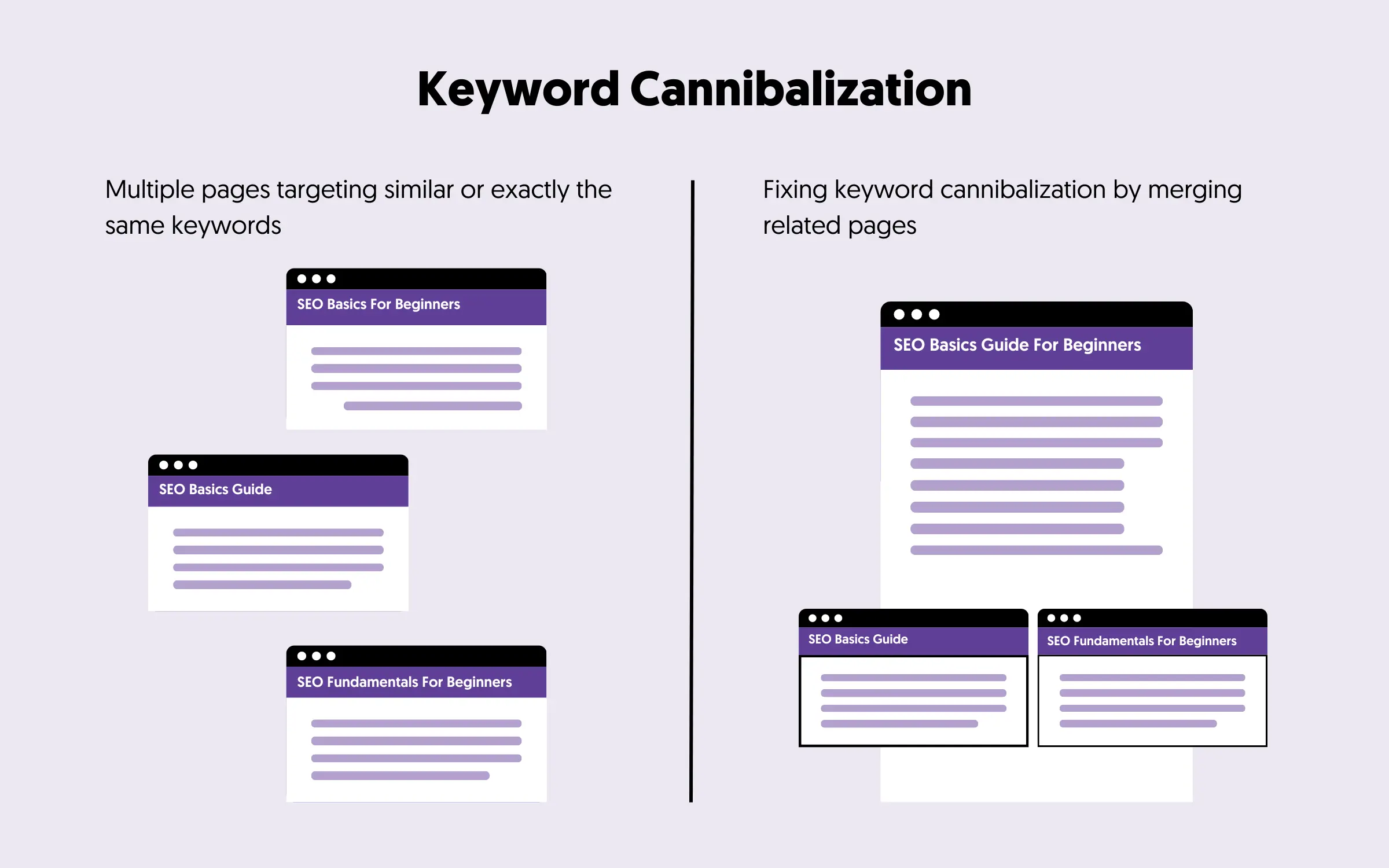Are you struggling to see your website rank higher on search engines, even though you’re creating plenty of content? You might be facing a hidden problem called keyword cannibalization.
This sneaky issue happens when your own pages compete against each other for the same keywords, confusing search engines and hurting your rankings. You’ll discover exactly what keyword cannibalization is, why it can damage your SEO efforts, and simple steps you can take to fix it.
Keep reading to unlock the secret to boosting your site’s visibility and getting more traffic without creating more content.
What Is Keyword Cannibalization
Keyword cannibalization happens when multiple pages on one website target the same keyword. This confuses search engines about which page to rank. Instead of helping your SEO, it can hurt your rankings and reduce traffic.
Each page should focus on a unique keyword or topic. This helps search engines understand your site better and show the right page to users.
What Is Keyword Cannibalization?
Keyword cannibalization means several pages compete for the same keyword. This splits the power of your SEO between those pages.
Search engines may rank one page lower or show a less relevant page. Your site loses clear focus and authority on that topic.
Why Does Keyword Cannibalization Happen?
It often happens by accident. Writers or marketers create many pages on similar topics. Each page tries to rank for the same keyword.
Without a clear strategy, websites end up with overlapping content. This causes confusion for search engines and users alike.
How To Spot Keyword Cannibalization?
Look for multiple pages ranking for the same keyword. Use SEO tools to check which pages appear in search results.
Check your website’s structure and content closely. Find pages with very similar titles, descriptions, or topics.

Credit: mangools.com
Signs Of Keyword Cannibalization
Keyword cannibalization can hurt your website’s performance. It happens when multiple pages target the same keyword. This confuses search engines about which page to rank. Recognizing the signs helps fix the problem quickly. Here are key signs to watch for.
Declining Rankings
Your pages may drop in search rankings suddenly. Multiple pages fighting for one keyword cause this. Search engines struggle to pick the best page. This lowers the overall ranking for all pages involved.
Traffic Drops
Traffic to your site can fall without clear reasons. Visitors might find different pages with similar content. This splits the clicks between pages. As a result, fewer users visit any single page.
Confusing Search Intent
Pages may target the same keyword but answer different questions. This confuses both users and search engines. Users may leave quickly if the page doesn’t match their needs. Search engines then rank the pages lower.
Causes Of Keyword Cannibalization
Keyword cannibalization happens when several pages on one website compete for the same search terms. This makes it hard for search engines to decide which page to rank. Understanding the causes helps fix the problem and improve SEO results.
Multiple Pages Targeting Same Keywords
Many websites create several pages about the same topic. Each page tries to rank for identical keywords. This confuses search engines and splits the ranking power. Instead of one strong page, you get many weaker ones.
Overlapping Content
Content that repeats or closely mirrors other pages causes issues. Search engines see this as duplicate or very similar content. It lowers the chance any page ranks well. Unique content on each page avoids this problem.
Poor Internal Linking
Internal links guide search engines and users through a website. If these links are unclear or random, search engines may not know the main page for a keyword. Proper linking highlights the most important page for each topic.

Credit: digitalmarketinginstitute.com
Tools To Detect Cannibalization
Detecting keyword cannibalization is vital for good SEO. It helps you find pages that compete for the same keywords. Several tools make this task easier. They analyze your website and show where issues exist. Using these tools saves time and improves site ranking.
Google Search Console
Google Search Console shows which pages rank for specific keywords. It lists impressions, clicks, and average position. You can spot if multiple pages rank for the same term. This tool is free and easy to use. It helps identify keyword cannibalization directly from Google data.
Seo Auditing Tools
SEO auditing tools scan your entire website quickly. They find pages with overlapping keywords. These tools highlight content that competes against itself. Common options include Ahrefs, SEMrush, and Screaming Frog. They provide detailed reports to fix cannibalization issues.
Keyword Tracking Software
Keyword tracking software monitors keyword rankings over time. It tracks multiple pages for the same keyword. This helps detect if your site splits ranking power between pages. You can adjust content based on tracking results. Popular tools include Serpstat and Moz Pro.
Quick Fixes To Resolve Cannibalization
Keyword cannibalization can harm your website’s SEO. It makes search engines confused about which page to rank. Quick fixes help fix this problem fast. These methods improve clarity and boost your rankings.
Consolidate Content
Combine similar pages into one strong page. This stops pages from competing against each other. Edit the content to cover all key points clearly. Use one main target keyword on the new page. Delete or redirect the old pages to avoid confusion.
Use 301 Redirects
Redirect weaker or duplicate pages to the main page. A 301 redirect tells search engines the page moved permanently. This transfers SEO value to the best page. It also improves user experience by sending visitors to one place. Check all redirects to ensure they work properly.
Optimize Internal Links
Link your pages wisely within your website. Use clear anchor text that matches your keywords. Point more internal links to the main page about a topic. Reduce links to less important pages on the same subject. This signals to search engines which page is most important.

Credit: www.reliablesoft.net
Long-term Strategies For Prevention
Preventing keyword cannibalization requires careful planning and ongoing effort. Long-term strategies help keep your website organized and clear for search engines. These approaches improve your SEO and user experience over time.
Keyword Mapping
Keyword mapping assigns specific keywords to each page on your site. This avoids overlap and confusion for search engines. Create a simple chart listing pages and their target keywords. Update this map as you add new content. This keeps your site focused and prevents keyword conflicts.
Content Planning
Plan your content with keyword focus in mind. Write topics that cover different aspects of your niche. Avoid repeating the same keywords on multiple pages. Use your keyword map to guide content creation. This strategy helps spread your SEO value across many pages.
Regular Seo Audits
Perform SEO audits regularly to spot keyword cannibalization early. Check if multiple pages compete for the same keyword. Use tools or manual checks to find these issues. Fix problems by merging, rewriting, or changing target keywords. Consistent audits keep your SEO healthy and effective.
Measuring The Impact On Seo
Measuring the impact of keyword cannibalization on SEO helps you understand its effects. It shows how your website performs after fixing or identifying the issue. Tracking key SEO metrics reveals if your site gains or loses visibility.
This process needs clear data and consistent monitoring. You can compare results before and after changes. Focus on rankings, traffic, and conversions to get the full picture.
Tracking Ranking Improvements
Check your keyword rankings regularly to see changes. Note if pages competing for the same keyword have shifted positions. A clear rise in rankings means less cannibalization.
Use tools like Google Search Console or third-party rank trackers. Look for steady ranking growth on the main target page. This shows your SEO efforts are working.
Monitoring Traffic Changes
Watch your website traffic to detect any shifts in visitor numbers. More traffic on your targeted pages suggests improved SEO health. Traffic drops could mean unresolved cannibalization problems.
Analyze organic search traffic specifically. This data helps you find patterns linked to keyword conflicts. Keep an eye on top landing pages for signs of improvement.
Analyzing Conversion Rates
Conversions reveal how well your visitors complete goals like purchases or sign-ups. Higher conversion rates on main pages indicate better keyword focus. Cannibalization often confuses users, lowering conversions.
Use analytics tools to track conversion data. Compare before and after fixes to see real impact. Solid conversion growth means your SEO strategy helps users find what they want.
Frequently Asked Questions
What Is Keyword Cannibalization In Seo?
Keyword cannibalization happens when multiple pages target the same keyword. This causes search engines to struggle choosing the best page. It can lower your rankings and reduce traffic. Avoiding cannibalization helps improve your website’s SEO performance and user experience.
How Does Keyword Cannibalization Affect Website Rankings?
Cannibalization confuses search engines about which page to rank. This often leads to lower rankings for all competing pages. It divides link equity and reduces click-through rates. Fixing it consolidates authority and boosts your overall SEO rankings.
How Can I Identify Keyword Cannibalization On My Site?
Use SEO tools like Google Search Console or Ahrefs to find overlapping keywords. Check for multiple pages ranking for the same term. Analyze your content and URLs to spot duplication. Regular audits help prevent keyword cannibalization issues.
What Are The Best Ways To Fix Keyword Cannibalization?
Consolidate similar content into one authoritative page. Use 301 redirects to merge duplicate pages. Optimize each page for unique keywords. Regularly update your content strategy to avoid overlap. This improves SEO clarity and boosts rankings.
Conclusion
Keyword cannibalization can harm your website’s search rankings. It splits traffic between pages and confuses search engines. Fix it by choosing one main page for each keyword. Use clear titles and unique content on every page. Check your site regularly to avoid overlaps.
This helps improve your site’s clarity and boosts SEO. Keep your content organized and focused. Your visitors and search engines will thank you.

